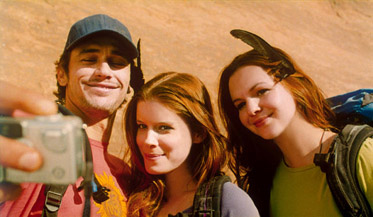Movie Review: 127 Hours
By Matthew Huntley
November 10, 2010
BoxOfficeProphets.com

This is the simple set up for 127 Hours, the raw and harrowing film from director Danny Boyle. I’m sure when Aron’s autobiography, Between a Rock and a Hard Place, made the bestseller list, it was a no-brainer his story would eventually be filmed. But at the risk of undermining Aron’s near-fatal adventure, this is not a very complicated tale, and as a movie, it is a basic story of survival. While it contains moments that are compelling, poignant and intense, it is not an inspired film, which isn’t to say it’s not inspirational.
Danny Boyle does a worthy job of bringing Aron’s story to the screen, and while he isn’t afraid to show us the most gruesome details of Aron’s plight or dare us to commit to this singular character in a confined space for the bulk of the run time, the movie doesn’t reach the same heights as Boyle’s previous efforts. Was that inevitable given the nature of this story, which is, for lack of a better phrase, so cut and dry? Perhaps Boyle believed Aron’s inherent story of survival was palpable enough that it didn’t require the magical artistry he usually delivers. The movie plays well straight, but it plays traditionally.
The film stars James Franco, who’s pitch-perfect as the fearless and capricious Aron. Franco plays him as sort of a big kid, and though we may find him a tad kooky, we like him and admire his sense of adventure, even if it isn’t well planned. As he’s exploring Blue John Canyon, he meets two wandering girls, Kristi (Kate Mara) and Megan (Amber Tamblyn), and shows them a secret reservoir before taking off on his own. While hiking through a narrow cavity, he slips on the same boulder that would eventually crush his right arm. When it happens, the immediate look on Aron’s face says it all: this rock is not moving and he’s trapped. We can sense his heart sink.
What the film does remarkably well is capture the physical and mental point of view of its protagonist, who knows there’s no easy way out of his predicament. That’s not easy for someone like Aron, who’s used to living so impulsively and dangerously. It is wise not to cut to any of his family, friends or co-workers, who may have been asking where Aron is, but their supposed thoughts seem irrelevant. The camera stays with Aron the entire time, and we truly empathize with him, so much that we start to imagine ourselves behaving the same way he does. He constantly checks his watch; he recollects random moments with his parents (Treat Williams and Kate Burton) and ex-girlfriend (Clémence Poésy); he thinks about the party Kristi and Megan invited him to with the inflatable Scooby-Doo; he dreams about Gatorade, Mountain Dew and water; and he thinks about all the things we take for granted, like the sun, the waves or the comforting ambience of music and TV. At the very least, the movie reminds us to be thankful and responsible for what we have, and to always let someone know where we’re going!
127 Hours has already gained notoriety for its graphic content, but it’d be a shame if that’s all people took from it, or the only reason they chose to see it in the first place. It works as a touching and provocative fable, with some breathtaking cinematography by Enrique Chediak and Anthony Dod Mantle, and contains a strong, layered performance from James Franco. True: it doesn’t reach too far beyond what we already know it’s going to tell us or how. Coincidentally enough, the structure of the film feels trapped and unable to set itself free from the confines of its own conflict. But again, that may be inevitable given the nature of the tale. Danny Boyle has crafted a rich and engaging film to be sure, and it invokes admiration and emotion, but not a whole lot of surprises - not the usual Danny Boyle kind anyway.